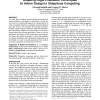Free Online Productivity Tools
i2Speak
i2Symbol
i2OCR
iTex2Img
iWeb2Print
iWeb2Shot
i2Type
iPdf2Split
iPdf2Merge
i2Bopomofo
i2Arabic
i2Style
i2Image
i2PDF
iLatex2Rtf
Sci2ools
125
click to vote
CHI
2005
ACM
2005
ACM
Privacy and proportionality: adapting legal evaluation techniques to inform design in ubiquitous computing
We argue that an analytic proportionality assessment balancing usefulness and burden on individual or group privacy must be conducted throughout the design process to create acceptable ubiquitous computing (ubicomp) applications and services. We introduce the principle of proportionality, which originates within the legal and data protection communities. Inspired by this principle, we develop a design method for ubicomp applications, based on our own experience, and aimed at HCI practitioners and designers. We discuss the method in relation to real-world examples, user inquiry techniques and requirements engineering models. Finally, we report a sample application of the method, involving a ubiquitous, personal memory aid tool. Categories & Subject Descriptors: D.2.2 [Software Engineering]: Design Tools and Techniques; K.4.1 [Computers And Society]: Public Policy Issues ? Privacy; D.2.1 [Software Engineering]: Requirements/Specifications General Terms: Design, Legal Aspects.
Acceptable Ubiquitous Computing | Analytic Proportionality Assessment | CHI 2005 | Human Computer Interaction | Ubicomp Applications |
| Added | 30 Nov 2009 |
| Updated | 30 Nov 2009 |
| Type | Conference |
| Year | 2005 |
| Where | CHI |
| Authors | Giovanni Iachello, Gregory D. Abowd |
Comments (0)

